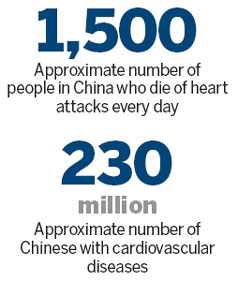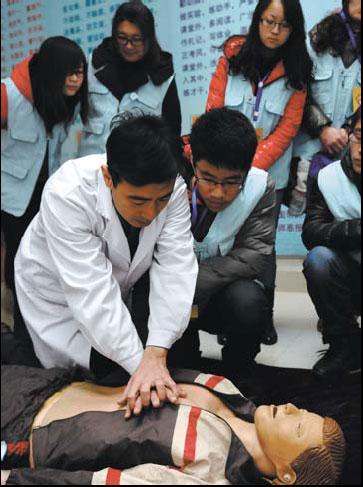Listen to your body before it's too late
Updated: 2013-03-13 07:32
By Liu Zhihua (China Daily)
|
||||||||
|
A group of volunteers gather for a class on first aid and cardiopulmonary resuscitation in Liaocheng, Shandong province. Zhang Zhenxiang / For China Daily |
One of the sadder news that came out from last week's national parliamentary sessions was the sudden death of Hangzhou mayor Shao Zhanwei, who suffered a heart attack during the meetings.
According to statistics, China now has about 230 million people with cardiovascular diseases, in the high risk group of having heart problems and stroke.
About 1,500 people die of heart attacks every day, according to Zhang Shu, a member of the Chinese People's Political Consultative Conference, and a heart disease specialist with Fu Wai Hospital, one of China's largest hospitals specializing in cardiovascular diseases.
Many such deaths could have been avoided, Zhang says, if people around them were made more aware of their health conditions and knew how to administer first aid. Zhang was speaking at a conference on Saturday organized by Health Times, a publication covering health news in China.
"People think sudden death is hard to prevent. They are very wrong," says Fan Li, an elderly diseases specialist, vice-president of the Military 301 Hospital in Beijing, and a CPPCC member.

"Sudden deaths always have signs long before the final attack, and can be prevented."
However, although the Chinese now pay more attention to health, their knowledge of disease prevention and treatment is still distorted by irresponsible commercials and unqualified medical endorsement, Fan says.
The public needs better health-related knowledge, and medical professionals must bear the responsibility of educating them, he notes.
Ling Feng, director of neurosurgery department at Xuan Wu Hospital and a CPPCC member, says she believes prevention rather than cure is the best approach to save lives from cardiovascular diseases.
A healthy lifestyle, regular medical checkup and a good attitude are all important in preventing such diseases, Ling says.
First aid skills are also important in saving lives, and we still lack knowledge and experience here, the experts agree.
"When I lived abroad I noticed that first aid is a basic skill for many ordinary people, and they can use that skill to save people in need before an ambulance arrives," Fan says.
"In China, we quite often encounter patients who arrive at the hospital either having been given the wrong emergency treatment, or none at all."
Fan also suggests that elderly people must have with them a card that lists their medical conditions, and keep it with them always in case of a medical emergency.
liuzhihua@chinadaily.com.cn
(China Daily 03/13/2013 page19)

 In Photos: 7.0-magnitude quake hits Sichuan
In Photos: 7.0-magnitude quake hits Sichuan
 Li Na on Time cover, makes influential 100 list
Li Na on Time cover, makes influential 100 list
 FBI releases photos of 2 Boston bombings suspects
FBI releases photos of 2 Boston bombings suspects
 World's wackiest hairstyles
World's wackiest hairstyles
 Sandstorms strike Northwest China
Sandstorms strike Northwest China
 Never-seen photos of Madonna on display
Never-seen photos of Madonna on display
 H7N9 outbreak linked to waterfowl migration
H7N9 outbreak linked to waterfowl migration
 Dozens feared dead in Texas plant blast
Dozens feared dead in Texas plant blast
Most Viewed
Editor's Picks

|

|

|

|

|

|
Today's Top News
Live report: 7.0-magnitude quake hits Sichuan, heavy casualties feared
Boston suspect cornered on boat
Cross-talk artist helps to spread the word
'Green' awareness levels drop in Beijing
Palace Museum spruces up
First couple on Time's list of most influential
H7N9 flu transmission studied
Trading channels 'need to broaden'
US Weekly

|

|








